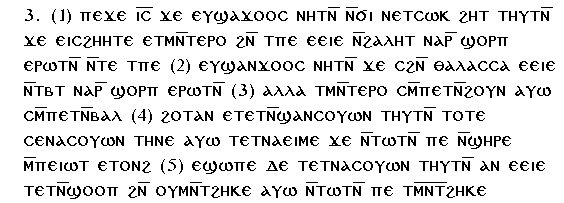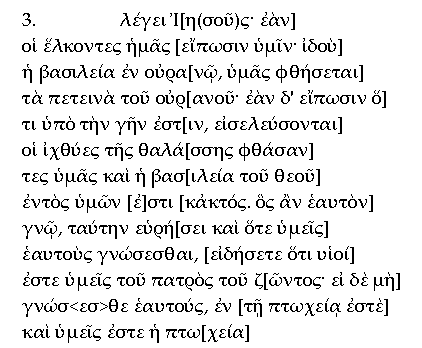Visitor Comments
There are other interesting parallels. See Deut. 30:11-14 and Romans 10:6-8.
- Steve Allison
"When you know yourself then you will be known" suggests that the grammatically based distinction between subject and object vanishes when we enter the Kingdom.
It suggests that our proclivity to make distinctions with our intellect obscures the unity of existence. Although this proclivity allows us to create "the world" (but only in our imagination), it also makes us miserable in it. It also leads us to do some very stupid things. There are no conceptual distinctions in the Kingdom of God. There is only life.
- Simon Magus
Simply put, this saying conveys the fact that God did not give us religion. We must find our own way.
- John Feth
Poverty is not knowing your self, for even then the birds and the fish proceed you.
- Ardele
The first two sentences suggest that Jesus is saying that many, if not all, of the leaders of Christians do not know what they are talking about when they talk about where sincere Christians are going and where true Christianity is going, which is to the kingdom.
- Steve Caper
Only if we could reach deep within ourselves God is in us. The daily evidence of God in us can be seen around us. Where is God? He does not sit in heaven or hell. He is omnipotent...just being and just here. That's a consolation. And my personal favourite verse.
- pilgrim
Poverty is a technical term ---poverty of egoism is the target. Then you will know yourself. Knowing yourself entails overcoming your lower nature [cf nafs], one becomes impoverished of its contaminants so to say
- Thief37
"When you know yourself then you will be known"....is synonymous with "know thyself." Once we start to know ourselves then we may realize God's existense is within as it is outside of ourselves, hence finding our value among all other beings in this world. Here lies the link between Christianity and all religions of the world. Another point worth mentioning is that about "being known"; to truly know yourself will make you known to others as this is the most difficult spiritual task known to man, and other seekers will wish to know how you got there...see what happend to Jesus! For further reading check what Buddha has to say on self knowledge, and even spiritualists such as Gurdjieff or Ouspenski.
- Owl
Jesus is saying the kingdom is within us. Anything outside of that realization has no value.
- King
This verse expresses what I deduced about a decade ago--that the Kingdom is not a physical place or a location so much as a state of mind. The way to get there is to live a good life, not to travel. It also has implications about churches--why would one piece of land be considered holy when the Kingdom itself, the Holy of Holies, is inside us?
- Dinwar
as Buddha said, know thyself and know ten thousand things, which is his way of saying you will know the source. In Buddhism the source is named nothing, which in it contains everything and the infinite.
- bravenewmind
God dwells in each of us. When we mutually acknowledge His presence, we take a step individually and as collectively toward peace, brotherhood, and equality.
- arbykay
|
Scholarly Quotes
Funk and Hoover point out a similar text in Baruch 3:29-30: "Has anyone climbed up to heaven and found wisdom? Has anyone returned with her from the clouds? Has anyone crossed the sea and discovered her? Has anyone purchased her with gold coin?" (The Five Gospels, p. 472)
Marvin Meyer quotes a similar expression from the Manichaean Psalm Book 160,20-21: "Heaven's kingdom, look, it is inside us, look, it is outside us. If we believe in it, we shall live in it for ever." (The Gospel of Thomas: The Hidden Sayings of Jesus, p. 69)
Robert M. Grant and David Noel Freedman write: "The Greek version of Thomas says that the kingdom is within; the Coptic adds that it is also outside, perhaps because the Naassenes spoke of the kingdom as 'hidden and manifest at the same time.' According to Saying 111, the kingdom 'is spread out upon the earth, and men do not see it.' It should be noted that Thomas does not speak of 'the kingdom of God.' Indeed, 'God' is mentioned only in Saying 97, where he is evidently subordinated to Jesus ('gods' occurs in Saying 31). Wherever the synoptic parallels speak of God, Thomas deletes the word or substitutes 'heaven' or 'the Father' or 'my Father.' Like other Gnostics, he prefers not to use the ordinary term 'God'; he may be reserving it for use as the name of an inferior power." (The Secret Sayings of Jesus, p. 121)
J. D. Crossan writes: "most likely, the correct restoration for the fragmented line 15 of Papyrus Oxyrhynchus 654 is 'king[dom of God],' the same phrase that appears in lines 7-8 of Papyrus Oxyrhynchus 1. Both those expressions from the Greek fragments of the Gospel of Thomas met with, according to Harold Attridge, 'deliberate deletion' in their respective Coptic translations at Gospel of Thomas 3 and 27" (The Historical Jesus, p. 284).
Stevan Davies writes: "When people actualize their inherent ability to perceive through primordial light, they perceive the world to be the kingdom of God (Gos. Thom. 3, 113)." (http://www.misericordia.edu/users/davies/thomas/jblprot.htm)
Robert M. Grant and David Noel Freedman write: "The Kingdom of God is no longer an eschatological reality. It has become a present, 'spiritual' phenomenon. It is 'spread out upon the earth and men do not see it' (113/111). It is not in the heaven or in the sea (3/2; cf. Rom. 10:6-7) but 'within you and outside you.' The inwardness of the Kingdom is derived, in Gnostic exegesis, from Luke 17:21; the outwardness probably refers to its heavenly or incomprehensible nature. In any event, it is not future, but present." (Gnosticism & Early Christianity, p. 187)
Funk and Hoover write: "This phrase ['know yourselves'] is a secular proverb often attributed to Socrates. It is used here to refer to the self as an entity that has descended from God - a central gnostic concept. 'Children of the living Father' (v. 4) is also a gnostic phrase (compare Thomas 49-50), which refers to people who, by virtue of their special knowledge, are able to reascend to the heavenly domain of their Father. Parallels in more orthodox Christian texts indicate that followers of Jesus are also called 'children.' The use of the term 'poverty' for life outside true knowledge (v. 5) is typical of gnostic writings." (The Five Gospels, pp. 472-473)
Bruce Chilton writes: "In fact, the closest analogy in the Synoptic Gospels to the rhetoric of the argument in Thomas 3 is attributed not to Jesus but to his Sadducean opponents (Matt. 22:23-33; Mark 12:18-27; Luke 20:27-40). They set up a hypothetical question of a woman who marries a man, who then dies childless. Following the practice commanded in Deut. 23:5-6, his brother marries her to continue the deceased's name, but then he dies childless as well, as do his five remaining brothers. The point of this complicated scenario is to ridicule the idea of the resurrection of the dead by asking whose wife the woman will be in the resurrection. As in Thomas 3, the syllogism is designed to provoke mockery of the position that is attacked, and it depends on the prior acceptance of what it is reasonable to say and of how logic should be used. In short, both the Sadducees' argument and the argument of the 'living Jesus' commend themselves to schoolmen and seem as far from the ethos of Jesus himself as the concern for what the leaders of churches might say. Those who would attribute the form of Thomas 3 to Jesus reveal only their own uncritical attachment to a source that is fashionable in certain circles simply because it is not canonical." (Pure Kingdom, p. 72)
|

